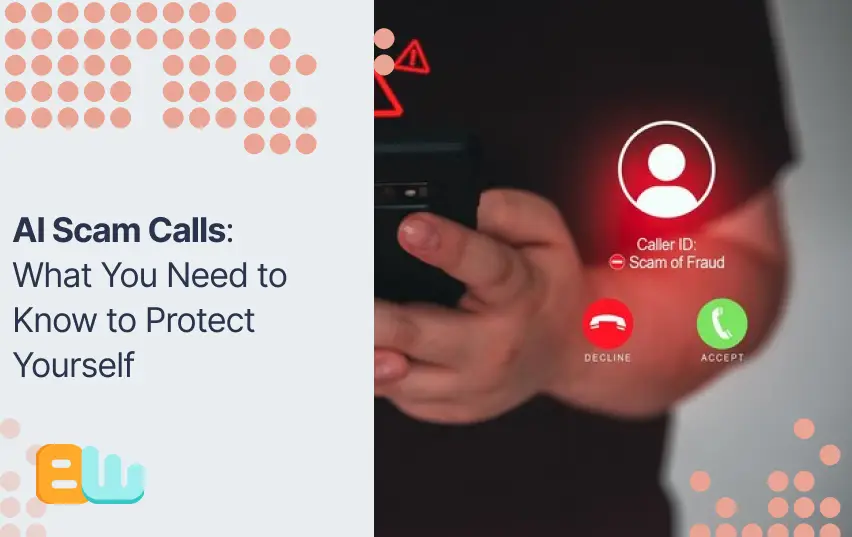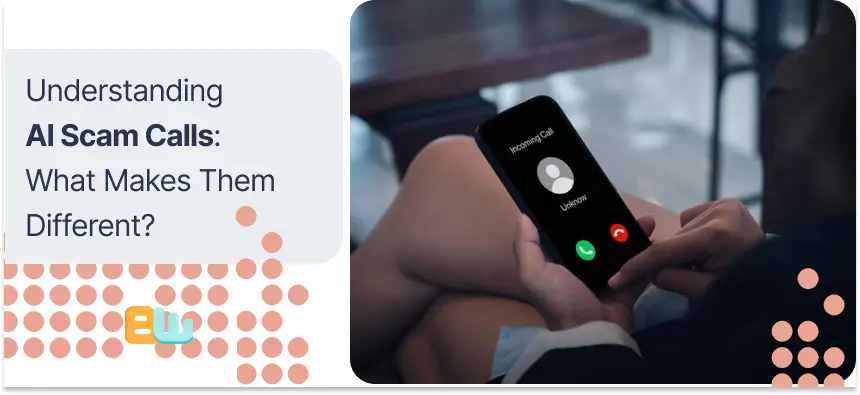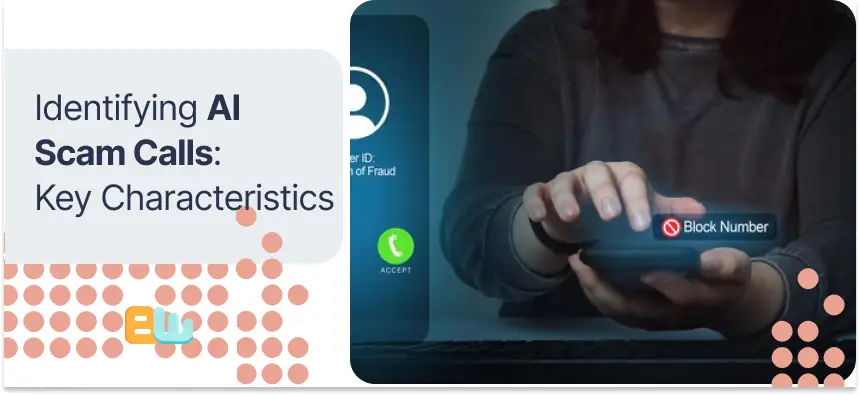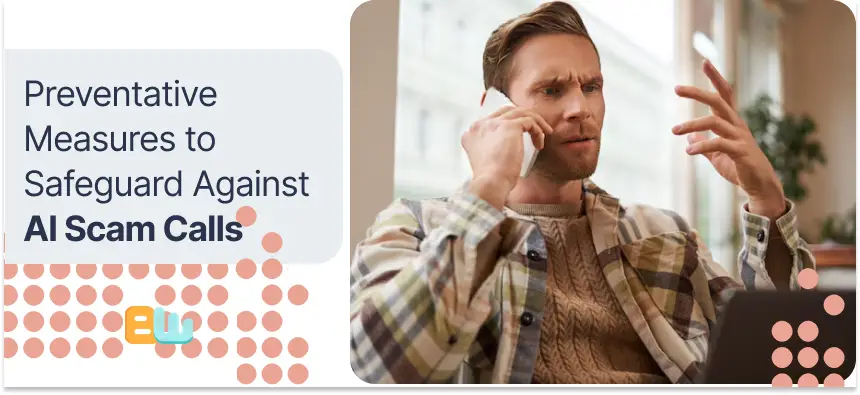
Artificial intelligence is changing many areas but has also created new scams. One worry is the increase in scam phone calls using AI. Scammers can now copy voices that sound very real, which makes it hard to tell if a call is real or fake. This article will help you learn how to recognize and protect yourself from these scams.
Understanding AI Scam Calls: What Makes Them Different?

Traditional scam calls used simple scripts, which were easier to spot. Now, AI scam calls are more advanced. They take advantage of our feelings by using familiar voices. This makes it easier for them to trick people.
What makes these calls different is new technology like voice cloning. Scammers can copy the voice of someone you trust, like a family member or a close friend, making the scam seem more real and dangerous.
The Rise of AI in Scam Calls
The use of artificial intelligence in scams is growing quickly as AI technology improves. One reason for this rise is that advanced tools are now easier to obtain. Voice cloning software, which used to be complex and costly, is now available for many people. It allows those with little technical skill to create realistic audio deep fakes.
Because of this easy access, AI scam calls are increasing. Criminals can now impersonate others with surprising accuracy. An audio clip from social media or a voicemail message is often enough for AI to study and copy a person’s voice.
As AI technology changes, these scams are likely to become even trickier to spot. Raising awareness about these changes is essential. Educating people on how AI scam calls work can help reduce their effects.
How AI Scam Calls Work: An Overview
The way AI voice scams work is quite simple. First, the scammer gets a voice sample of someone close to the target. They can find this audio from many online places, including videos on social media, voice messages, or old phone calls that were recorded without permission.
After getting the voice sample, they use voice cloning software. This software looks at how the person talks, as well as their tone and style. It creates a digital copy of the voice that sounds real.
With this tool, the scammer calls the victim. They pretend to be the person whose voice they copied and say they are in trouble. They create a sense of urgency by immediately claiming they need money or sensitive personal information.
Identifying AI Scam Calls: Key Characteristics

AI scam calls can seem real, but some signs can help you spot them and avoid getting tricked. Knowing these signs can help you stay careful when making strange calls.
One key thing to consider is if the caller acts oddly or asks for something unusual. This is especially true if they talk differently than they usually do. Also, be careful of calls from unknown numbers. Even if a familiar name or number appears on your caller ID, it could still be a scam.
Unusual Requests and Urgency
Many voice scams, especially those using AI, aim to create urgency. Scammers try to exploit people’s emotions and push victims to act quickly without thinking. Be careful of calls that require immediate action, especially if they involve money or sensitive information.
Another warning sign is receiving calls from an unknown number. If the caller wants personal or financial details, be extra cautious. Real companies usually have clear communication channels and do not often make random calls for sensitive information. If you don’t recognize the caller and can’t check who they are, it’s best to hang up.
Always remember that scammers like to target unprepared people. By knowing these tricks and staying calm in tense situations, you can lower your chances of becoming a victim of these scams.
Voice Cloning: When Familiar Voices Are Not So Familiar
Voice cloning technology can be helpful but is also easy to misuse. Scammers can create realistic fake audio that sounds like a family member is calling you. However, no technology is perfect, and there might be slight hints that show the voice could be more authentic.
Pay attention to the voice’s details. Does it sound a bit robotic or too smooth? Are there strange pauses or changes in tone that don’t match how your family member usually talks?
It can be difficult to distinguish real voices from cloned ones, but trusting your feelings is very important. If something seems wrong about the call, it is better to be careful. Don’t be afraid to ask questions that only the real person would know or check their identity in other ways.
Preventative Measures to Safeguard Against AI Scam Calls

Staying safe from scammers means being active and taking steps to lower your chance of getting tricked by AI scam calls. These scams can be tricky, but you can protect yourself with simple actions.
First, keeping up with current scams and learning how fraudsters work is important. Knowing what to look for can help you spot and avoid scams. Remember, learning about scams gives you the strength to avoid becoming a victim.
The Importance of Questioning Anomalies
In today’s digital world, AI scams are becoming more common. To keep your cybersecurity safe, it is essential to question anything unusual. Always be careful with any unexpected requests for personal information, especially if they come through phone calls.
If a caller says they are from a legitimate organization or someone you know, don’t hesitate to ask them questions. For example, if someone pretends to be from your bank and asks for sensitive information, just hang up. Then, call the bank back using their official number to check if the call was accurate.
Being curious and not sharing personal information without checking first can lower your chances of being caught in AI scams. Stay safe online takes constant awareness and an intelligent approach to dealing with possible threats.
Setting Up Verbal Passwords With Loved Ones
Implementing verbal passwords with your loved ones can add an extra layer of security and help you verify their identity in situations where you might suspect an AI scam call. These passwords should be unique phrases or words that only you and your family know.
The idea is simple: If you receive a call from someone claiming to be a family member, ask them for the pre-determined safe word. If they cannot provide it, you’ll immediately know that it’s likely a scammer.
Actionable Steps If You Suspect an AI Scam Call

Suspecting you are getting a scam call from an AI can feel scary. It’s essential to know how to respond quickly to reduce any harm. Even though technology keeps changing, your awareness and quick actions are the best ways to protect yourself.
The most crucial step is to stay calm. Scammers often use fear and confusion to trick people into doing what they want. Instead, take a moment to look at the situation carefully. Then, follow these steps to keep yourself safe.
How to Properly Disconnect and Verify Caller Identity
If you think you’ve received a scam phone call, especially one using AI voice cloning, it’s very important to hang up right away. Do not keep talking. This could allow the scammers to trick you or gather more details.
After you hang up, take a moment to calm down. It is expected to feel shaken, but try to clear your mind for the next steps. Instead of calling back the number immediately, check who the caller was and what they said.
If they said they were from a particular company or organization, contact them using their actual phone number or website. Use other ways to connect for personal contacts, like texting, messaging, or calling a family member you trust. You can also ask your service provider about call-blocking options to stop future calls from suspicious numbers.
Reporting the Incident: Where and How
Reporting AI scam calls is very important for a few reasons. First, it helps authorities track down these scams, stopping destructive operations and protecting others from being tricked. Second, your report can give valuable details that help find the people behind these scams and hold them responsible.
It’s also crucial to know where to report these calls. Here are some places to report AI scam calls:
- Federal Trade Commission (FTC): The FTC handles complaints about fraud, including AI scam calls. You can report online on their website.
- Internet Crime Complaint Center (IC3): This group focuses on cybercrime. You can contact them about scams using online methods, like voice cloning technology.
- Your Local Police Department: They may not have the tools to investigate each case, but reporting locally helps create a record, which can be useful for later investigations.
Also, telling your friends and family about AI scam calls is a great way to help fight these scams.
Conclusion
In conclusion, it is essential to stay alert and informed to protect yourself from AI scam calls. With AI technology becoming more common in scams, knowing the main signs and taking steps to prevent them is vital. Question anything unusual. Use verbal passwords and be prepared to react if you think a call is a scam. You can keep yourself and your family safe. Always hang up, check who is calling, and immediately report anything suspicious. Keep learning about the risks of AI scam calls to stay ahead of possible threats.
